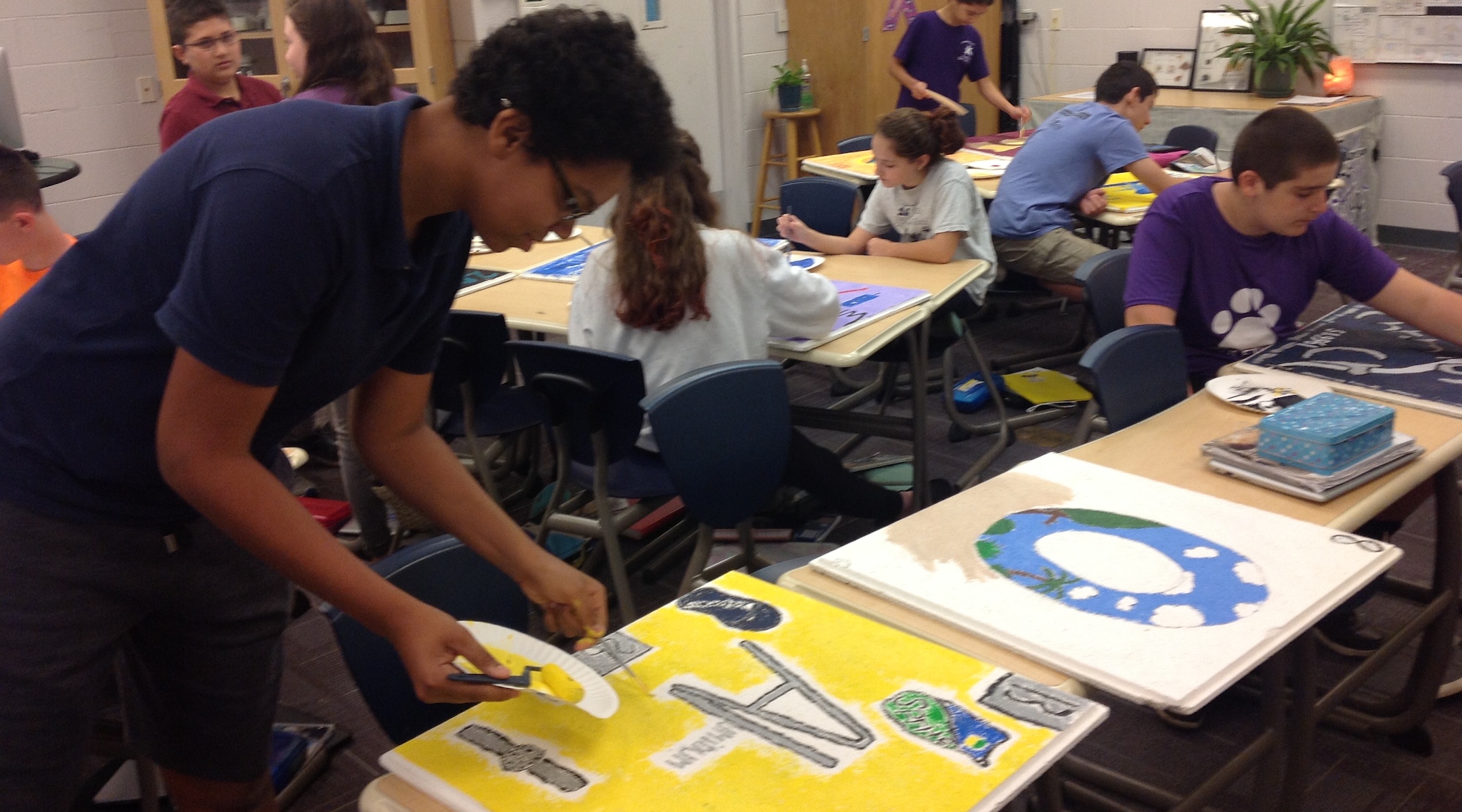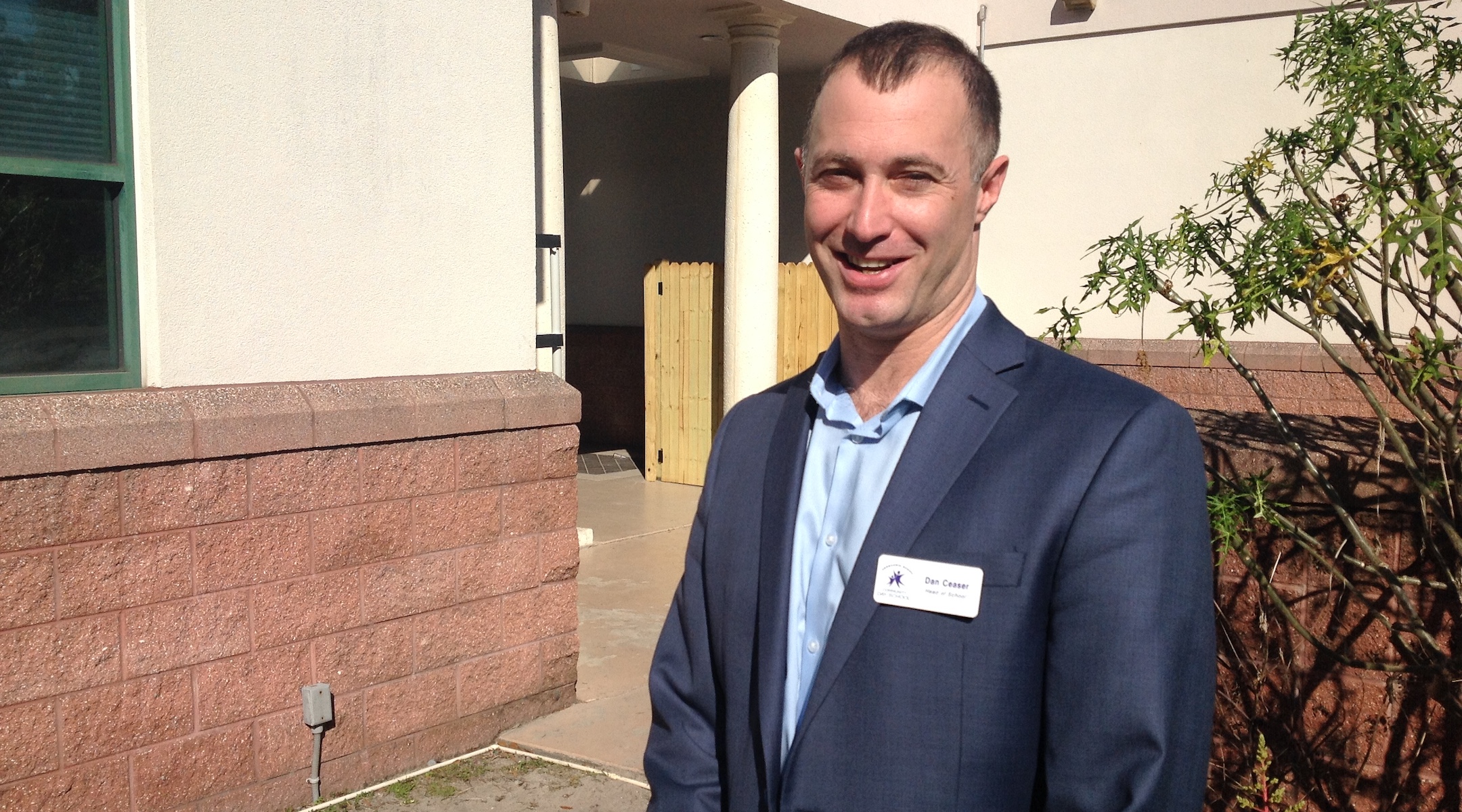Chabad Lubavitch of Sarasota & Manatee Counties
At this Florida Jewish day school, half the students aren’t Jewish

Students at Hershorin Schiff Community Day School in Sarasota,
Fla. create panels for the periodic table of elements
SARASOTA, Florida (JTA) — Most American Jewish day schools go all in on Hanukkah, in part to remind their students that Jews have a winter holiday of their own.
But when December rolls around at the Hershorin Schiff Community Day School in southwestern Florida, you’re almost as likely to see kids drawing Christmas trees as menorahs or dreidels. That’s because the school asks its students to design their own holiday plates — and almost half the students at this Jewish day school are not Jewish.
“Even though we only teach about Hanukkah, if they say, ‘we’re excited that we have a Christmas tree and a menorah in our house,’ if it’s important to our kids, we’re going to honor that and create a space for them to share that,” said Dan Ceaser, the head of school. “So while we’re teaching our Jewish traditions, we are creating a space for families to share their traditions and we are honoring those as well.”
The school has always been open to non-Jews, but it began emphasizing that inclusiveness — including a mission statement welcoming “children of all faiths” — when Ceaser, in his first job at a Jewish school, came on in 2015. Since then, Community Day’s enrollment has more than tripled, from 67 students in 2015 to 275 in the upcoming school year. It has students from preschool through eighth grade in a city with about 20,000 Jews.
The school is trying to strike a balance between teaching Jewish values, culture and practice on the one hand, and remaining inclusive on the other. In addition to its Judaism, the school appeals to families by emphasizing its diversity (students’ families hail from 40 countries) and a philosophy of independent, project-based learning.
The school is explicitly trying to serve as a model for other Jewish day schools as non-Orthodox Jewish schools struggle with rising costs and declining affiliation. Another experiment in pluralistic Jewish education, the American Hebrew Academy boarding school in North Carolina, closed abruptly this year, citing financial challenges.
For more than a decade, Hebrew-language charter schools have pursued a similar model. They’re open to students of all faiths and backgrounds and, in order to accept public funding, emphasize Israeli culture, not religious identity. What sets the Sarasota school apart is that, unlike charter schools, it is explicitly Jewish. Students pray, eat kosher-style food and celebrate Shabbat. Tuition is on a sliding scale, but averages $9,300 per child.
“The best way to fight anti-Semitism and injustice is not just to educate Jews but to educate non-Jews about the importance of advocating for all,” Ceaser said. “We welcome you as you are and we’ll celebrate what you bring to us. That’s in terms of faith, affiliation, culture, ethnicity, families that identify as non-traditional.”

Dan
Ceaser, the head of school of Hershorin Schiff Community Day School,
has made the school’s diversity a centerpiece of its message. (Ben
Sales)
Starting the following year, students split off into studying one of the two languages intensively. There are also a few different religious studies tracks kids can choose — from world religions to Jewish studies to a more intensive, four-day-a-week traditional Jewish track run by Rabbi Chaim Steinmetz, director of Chabad Lubavitch of Sarasota & Manatee Counties, that will have a handful of kids this year.
“It’s kind of cool to compare the two religions,” said Matthew Cook, who will be entering 8th grade at the school and is a practicing Catholic. “The challah and the wine, there’s something a lot similar, it’s bread and wine — almost the same thing. Just [to me] it represents the body of Christ and the blood.”
In Hebrew class, the emphasis is on learning how to order falafel, or listening to classic Israeli singers, said Snait Ben-Herut, a Hebrew teacher. Ben-Herut said she gives kids an overview of Jewish history, which can get them interested in the language. Middle schoolers also travel to Israel every other year.
“The emphasis is less on writing and reading and more on the possibility of expressing yourself in Hebrew,” she said. “There’s an emphasis on the cultural side — Israeli slang, Israeli music, Israeli food. There’s an emphasis on Hebrew as a living, relevant language.”
The school also tries to cater to its diverse student body by being flexible in general. Classes will often have students from multiple grades. The curriculum is project-based, so students can (literally) get their hands dirty in a garden, choosing which vegetables to plant, or can devise a way to build a chicken coop on school grounds — a thing that actually happened.
Eric Pressman, who is Jewish and has two children at the school, appreciates that he can place them in a Jewish environment that does not cloister them away from the country’s non-Jewish majority.
“It allows our children to be raised with Jewish values, but it still embraces a multicultural feel,” he said. “It allows for children to prepare to engage in a diverse community, whether they do so academically or multiculturally or whether they do so occupationally. We don’t live in a Jewish microcosm.”

The school has a hallway of flags representing the 40 countries its students’ families hail from. (Ben Sales)
Recently, she was walking with her daughter in the supermarket and pulled a prepackaged school lunch of meat, cheese and crackers off the shelf. Her daughter made her put it back: It wasn’t kosher. Her kids also asked to light a menorah on Hanukkah.
Ceaser said the school’s atmosphere and philosophy aim to make the students empathetic to each other’s divergent experiences, religious or otherwise. One hallway in the school displays the flags of all of the students’ families’ home countries. Ceaser remembers when, after the flags were hung, a group of seventh-grade girls approached him urgently in the hallway to demand that the Nepali flag be rotated. It was hanging in the wrong direction, they said, and could hurt the feelings of their Nepali friend.
“They’re like, ‘No, we need to talk to you now,’” he recalled. “‘You hung that flag and our friend, we feel like if she sees it hung upside-down, she’s going to feel really disrespected.’ I’m the principal, and they’re stopping me to advocate for one of their friends.”
https://www.jta.org/2019/08/19/united-states/at-this-florida-jewish-day-school-half-the-students-arent-jewish?utm_source=JTA%20Maropost&utm_campaign=JTA&utm_medium=email&mpweb=1161-12981-21723





6 comments:
Lubavitch has so much in common with Christianity. Just instead of Jesus Christ they have Rebbe Moshiach. No wonder they are now together.
Lubavitch is not Judaism, it is Schneersianity. And I worry that their great-grandchildren might burn my great-grandchildren at the stake for not accepting Schneersus as the Messiah.
If I wanted a dead Moshiach I would join a Christian church.
So follow this:
Anyone that says they are Jewish are welcome in their schools. In fact, I know for certain, in most Chabad pre-schools the approximate number of non-Jews are as high as 40%. So they blend in, and some go through the system and wind up as "Jews" and marry others.
What do we have? A hodge-podge of intermarriage being passed off as legitimate Jews! You know what? They do not care.
Paul, follow these too:
Lamar Odom, the former NBA star who fell into a coma at a brothel in Nevada after using cocaine and other drugs, visits Lubavitcher Rebbe’s gravesite with his kids: “I heard he makes miracles happen.”
...another cutie:...
Rapper Nissim Baruch Black visits with Rav Chaim Kanievsky.
Chabad and Christianity are almost the same religion.
Christian gods: The Father, The Son, and the Holy Spirit
Chabad gods: The Father, The Son-in-law, and the Almighty Dollar
August 16, 2019
Rapper Nissim Black Holds Bris for Newborn Son
African-American rapper Nissim Black recently welcomed his sixth child, Shimon Meir Black, with his wife Adina.
Black posted about the bris on August 5, tweeting “Yesterday we welcomed our 6th child into the Covenant of Avraham Avinu. He’s camera shy…say hello to little Shimon Meir Black!”
Black was initially raised Sunni Muslim at birth, but then converted to Christianity at age 14 after attending Evangelical camp. After Black released his debut album in 2007, he started questioning his Christian beliefs and turned to Messianic Judaism, convincing his wife to follow in his footsteps.
He retired from his career in 2011. Black moved into Seward Park’s Jewish community and started studying for his conversion.
Shortly after the ending of his conversion Black’s son contracted meningitis which was a financial burden to the family. Because of this, Black resumed his rapping career and changed his stage name to Nissim.
— Sydney Kligman
Post a Comment